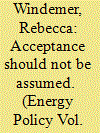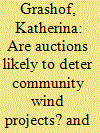|
|
|
Sort Order |
|
|
|
Items / Page
|
|
|
|
|
|
|
| Srl | Item |
| 1 |
ID:
191170


|
|
|
|
|
| Summary/Abstract |
Local community acceptance is a key influence on wind farm siting decisions. However, there is a temporal limitation to much social acceptance literature in that it does not consider how perceptions of the local community may change over the operational life of a wind farm and in the context of end-of-life applications for repowering or life-extension. In response, this paper increases the temporal depth of our understanding of social acceptance through presenting the results of survey research undertaken with communities living close to two English wind farms that have experienced end-of-life applications. For many respondents, perceptions of their local wind farm did not change following construction or over the life of the scheme, contrasting with common expectations that acceptance will increase over time. The findings reveal that community support for applications to repower or life-extend is influenced by experiences of living with the wind farm over time. It also shows how factors that have been found to impact perceptions of new wind farms, particularly the benefits that people experience, involvement in the planning process, and relationships with the developer, can influence responses to end-of-life applications. These insights are used to provide recommendations for end-of-life policy.
|
|
|
|
|
|
|
|
|
|
|
|
|
|
|
|
| 2 |
ID:
162944


|
|
|
|
|
| Summary/Abstract |
The use of auctions for determining the level of renewable energy remuneration is increasing. A cause for concern is the resulting potential to exclude smaller investors from the market, in particular community energy projects. However, empirical evidence and examination of resulting consequences have been insufficient so far. This article analyses the effects a shift from guaranteed remuneration to auctions might have on incentives to start new community wind projects, analysing the case of Germany. It thus contributes to research on investor-specific impacts of renewable energy policy instruments. An explanatory sequential mixed-method design was applied, combining surveys and interviews for the collection of expert assessments. The developed typology allows the assessment of the respective potential of different wind project types for procedural and distributive justice, which are understood to support local acceptance. Wind projects developed by the local community were found to be most beneficial for local acceptance, but appear to face the highest challenges in auctions. A crowding out of these projects would be particularly unfortunate with regard to the need to expand wind energy capacities much more. It is recommended that policy makers ensure a level playing field, also within the context of auctions, for wind projects developed by the local community.
|
|
|
|
|
|
|
|
|
|
|
|
|
|
|
|
| 3 |
ID:
192712


|
|
|
|
|
| Summary/Abstract |
We develop a concept to identify and quantitatively assess technology selection bias in multi-technology renewable energy auctions. We show that simple price rules are insufficient to efficiently select winning projects in multi-technology tenders when they incorporate individual costs of producers only, and exclude system effects, market benefits and external costs. With our concept of quantifying unit social value, all relevant external elements can be incorporated in the evaluation. The introduction of an objective measure (as difference of differences between unit social value and auction bid prices) allows the quantitative assessment of systematic selection bias between technologies under different remuneration designs. We illustrate our concept by applying it to generic European renewable energy technologies (wind and solar energy) and major applied remuneration types (contract-for-difference and fixed premium schemes). We also show that are concept is applicable for real auction data, by presenting a case study about Italy. The main conclusion of the study is that selection by price only, can constitute a systematic bias for all investigated remuneration designs. Both schemes are in our case biased toward a given technology. The internalisation of external cost may not necessarily lead to better social outcomes in the selection of auction winners, as it can be overshadowed by the initial bias of the chosen remuneration design. We conclude that considerate design, including the potential differentiation of rules, e.g., through introduction of a technology bonus, to minimise selection bias, and careful monitoring of the competitive situation between participating technologies in a multi-technology auction are required to ensure efficient selection.
|
|
|
|
|
|
|
|
|
|
|
|
|
|
|
|
|
|
|
|
|